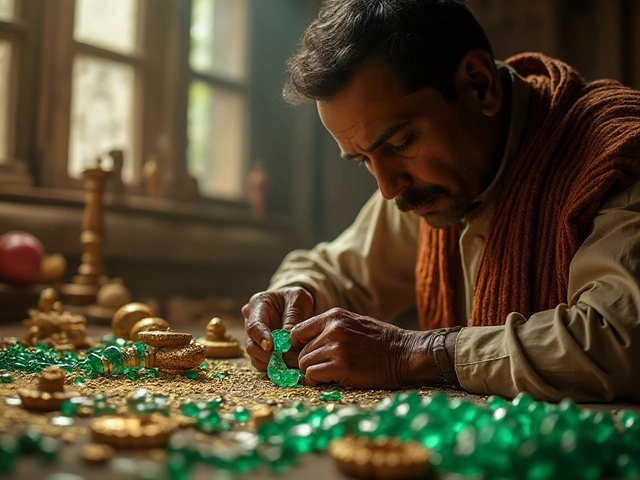
The simple act of wearing a black thread on one's wrist is much more than just a style choice in many Hindu communities. Ever wondered why? The tradition is steeped in cultural significance, weaving through layers of beliefs that span protection, spirituality, and even health.
For starters, it's commonly believed that the black thread wards off the evil eye. Got a neighbor with a jealousy problem? This little thread might just keep you safe! It's said to absorb negative energy, shielding the wearer from harm.
Beyond superstition, there's an astrological component, too. Many people choose auspicious times or specific lunar phases to tie these threads, hoping to sync up with cosmic rhythms. Ever felt like you're in tune with the universe? This might be why!
Practicality aside, there's also talk about health. Some believe the black thread can aid in circulation or prevent certain ailments, though take that with a pinch of salt. It's less about scientific proof and more about generations of whispers and wisdom.
- Historical Origins and Cultural Significance
- Beliefs Around Protection and Warding Off Evil
- Astrological Connections and Timing
- Health Beliefs and Benefits
- Modern Interpretations and Personal Stories
Historical Origins and Cultural Significance
Why do Hindus wear black thread on their wrists? The answer lies deep in the history and tradition of Hindu culture, which counts thousands of years of stories and beliefs. This simple accessory carries a load of cultural baggage that connects modern wearers back to ancient practices.
Historically, wearing threads, including black, as a kind of amulet or talisman, has its roots in Hindu lore. This tradition has been documented in texts like the Puranas, which highlight its role in rituals and daily life, emphasizing protection and spiritual power. Back then, these threads were often worn during important ceremonies, acting as a safeguard against evil spirits and negative energies.
The Importance of the Thread Color
In Hindu culture, black is considered a powerful color with the ability to ward off the evil eye. While it might seem counterintuitive since many cultures see black as something negative, here it’s about blocking bad vibes. It’s like having an invisible shield around you.There's also a spiritual aspect where the wrist thread serves as a reminder of one's beliefs and the protective grace of the gods. Waiving it off as mere superstition doesn’t do justice to the comfort and assurance it provides countless people who swear by its power.
A Symbol of Cultural Continuity
The current use of black threads might vary across different regions and communities within India, but the core idea remains. It's a beautiful example of cultural continuity where even younger generations find value in an age-old tradition. Across India, you'll find diverse ways of wearing and blessing these threads, each with a story as colorful as the next.However, not everyone wears it just for traditional reasons. Some choose it for its simplicity and style, a subtle nod to their roots while blending effortlessly with modern fashion sensibilities. So, whether it's about heritage or hashtag-worthy style, the black thread's cultural footprint is hard to miss.
Beliefs Around Protection and Warding Off Evil
Wearing a black thread on the wrist is more than just a cultural tradition; it's seen as a powerful shield against misfortune. Within Hindu beliefs, this simple thread is imbued with the power to protect individuals from the evil eye, also known as 'Nazar.' The idea is that envy or malevolent intentions can manifest as negative energy, affecting one’s health, prosperity, and overall well-being.
Understanding the Evil Eye
The concept of the evil eye is universal across many cultures, but in Hindu tradition, it's taken quite seriously. The evil eye can come from anyone, even unintentionally. Hence, the black thread serves as a defensive boundary, absorbing harmful intentions before they can affect the person.
How the Black Thread Works
The color black is traditionally believed to ward off negativity. It's considered a natural repellant to ill will and envy. Unlike other colored threads, black is chosen specifically for its strength in this protective role. The thread itself is often blessed or tied during certain religious ceremonies, adding a spiritual boost to its protective qualities.
Traditional and Personal Practices
Typically, the thread is tied on the right wrist for males and the left for females, although variations exist depending on specific community customs. Some families may involve rituals or prayers, seeking divine blessings for additional protection. These practices are common during pivotal life events, like weddings or starting a new job, where success could attract jealousy.
Modern Stories and Beliefs
Many people continue to share personal experiences of how wearing these threads has helped them. Stories range from sudden bumps in luck to inexplicable protection in risky situations. It’s not just an old-wife’s tale; countless individuals vouch for the psychological comfort and confidence it provides, guarding against unseen threats in a busy world.
While cynics might view these practices as mere superstition, the persistent popularity of wearing black threads speaks volumes about its importance in Hindu culture. It’s a tradition backed by centuries of belief, seamlessly blending spirituality with daily life to create a tangible sense of security.

Astrological Connections and Timing
Astrology plays a distinctive role in why many folks choose to tie a black thread on their wrists. You see, in Hindu traditions, timing is everything. It's believed that the position of planets and stars at any given moment can greatly influence the outcome of actions.
One reason the black thread tradition is connected to astrology is due to its association with the planet Saturn, known as Shani in Vedic astrology. Shani is a powerful force, associated with discipline and trials, but also with protection and inner strength. For those looking to appease Shani, wearing this thread can be a symbolic gesture towards earning his favor.
A common practice is to tie this black thread on Saturdays, the day governed by Saturn. It's considered an auspicious time when Shani’s influence is at its peak, aiming to harness protective energies for the week ahead.
Choosing the Right Time
So when's the best time to get this done? According to astrologers, certain lunar phases bring extra good vibes. The waxing phase, especially on a Saturday, is believed to be particularly powerful.
- Panchang: Many consult this traditional Hindu calendar for the most favorable timings.
- Consultation with Astrologers: Some individuals take it a step further by seeking guidance from professional astrologers, who may suggest a personalized timing based on one's birth chart.
Beyond Saturn
The influence isn’t limited to Saturn alone. Depending on individual horoscopes, astrologers might suggest the wearing of black threads to mitigate ill effects from other celestial bodies too.
While evidence can be anecdotal, the faith and tradition behind choosing the right astrological timing continue to guide many believers in their daily lives, turning these threads into personal talismans steeped in cosmic belief.
Health Beliefs and Benefits
When it comes to the black thread, some folks believe in more than just its protective aura. There's talk about its supposed health benefits too. Although science might not back all of these claims, the beliefs themselves are fascinating and give insight into traditional practices.
Improving Circulation
Some people think that wearing a black thread can positively impact blood circulation. While it might sound a bit like a stretch, supporters suggest that the pressure exerted by the thread could play a role similar to acupressure. Although not as precise as an acupuncture needle, it's thought to help maintain balance and flow throughout the body.
Skin-related Beliefs
This one is a bit quirky—some believe that the thread, when tied on a specific wrist, could help mitigate skin problems. It’s assumed that the contact of the thread with particular pressure points may offer soothing effects. Feel like your skin's acting up? It might just be worth a try, right?
Raw Energy Balance
Another interesting belief is around energy balance. The thread is said to absorb harmful energies, similar to how it’s supposed to ward off the evil eye. Some people wear the thread with the idea that it balances out the 'bad' energy in the body. It's kind of like a holistic energy detox, without the juice cleanse.
These ideas, passed through generations, reveal a layer of cultural wisdom about the mysterious little thread. While not scientifically proven, they continue to influence personal practices in many Hindu communities. Something to chew on, even if you take it with a grain of salty skepticism!

Modern Interpretations and Personal Stories
In today's world, the practice of wearing a black thread isn't just about age-old customs. It's a personal statement, often adapted for modern lifestyles and beliefs. Folks still reach for these unassuming threads but with their own twist.
Style Meets Tradition
For many, the black thread on the wrist is as much a fashion choice as it is a nod to tradition. Pair it with a smart watch or a sleek bracelet, and you’ve incorporated age-old wisdom into modern style. Some brands even sell designer versions, cashing in on this blend of past and present.
Personal Stories Worth Sharing
Ask people why they wear these threads, and you'll hear a multitude of stories. Take Priya from Bangalore, who started wearing a thread after her grandmother insisted it would protect her during exams. The exams went well, and now Priya swears by its protective powers, wearing it even during job interviews.
Or consider Raj in London who, after moving away from home, found comfort in this small piece of tradition. "It’s like having a piece of my roots with me," he says. He considers it a daily reminder of where he comes from, anchoring him amidst the hustle and bustle of city life.
Breaking Stereotypes
Not everyone who wears a black thread identifies as deeply religious or superstitious. For some, it’s a symbol of cultural pride, a simple way to express their heritage without words. A thread doesn’t define their beliefs, but it does connect them to their ancestors and culture.
Is It Still Relevant?
With globalization intersecting cultures, some might wonder about the importance of these threads today. Practical or not, they remain a quiet rebellion against forgetting roots. Modern adopters may redefine them, but at the heart, the black thread continues to symbolize a bridge between the spiritual and everyday worlds.
Whether for style, protection, or heritage, the black thread still resonates. It's a personal narrative that varies widely, but every tale adds another layer to this timeless practice.



